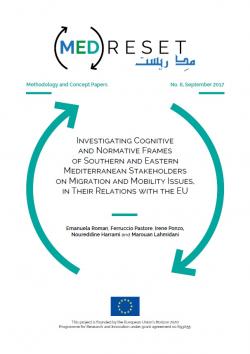Investigating Cognitive and Normative Frames of Southern and Eastern Mediterranean Stakeholders on Migration and Mobility Issues, in Their Relations with the EU
This paper outlines the conceptual and methodological guidelines for research in MEDRESET Work Package 7 (WP7). WP7 aims to develop a more sophisticated knowledge and awareness about the diverse frames, perceptions and priorities of a variety of stakeholders with regard to migration and mobility issues in the Mediterranean space, focusing on local stakeholders in four southern and eastern Mediterranean countries (Egypt, Lebanon, Morocco and Tunisia) – and among them on those actors who are generally excluded from Euro-Mediterranean dialogue and decision-making (e.g., civil society and grassroots organizations). Following an introduction on the dominant EU-driven frames on migration and mobility issues and the related policy agenda, the second section of this paper reviews the existing academic and expert literature produced on the two shores of the Mediterranean, highlighting dominant patterns and common trends. Drawing upon Boswell et al. (A1-2011), the fourth section of this paper provides the conceptual framework for the WP7 analysis of policy frames and framing processes in the area of migration and mobility, while the fifth section outlines the methodology adopted in WP7 research. The final section classifies the literature on migration and mobility produced on the two shores of the Mediterranean.
-
Details
Roma, IAI, September 2017, 42 p. -
In:
-
Issue
Methodology and Concept Paper 6
1. Some Introductory Remarks on Dominant Frames at the EU Level
2. Academic and Expert Literature on Migration and Mobility in the Mediterranean Space: An Overview of Dominant Patterns
2.1 European Literature
2.1.1 Academic Literature
2.1.2 Grey Literature
2.2 Southern and Eastern Mediterranean Literature
2.2.1 Structure and Evolution of Migration
2.2.2 Rights and Public Policy on Migration
2.2.3 Migrant Remittances and Impact of Migration on the Leaving Zones
2.3 Concluding Remarks
3. Integrating the Gender Perspective in Our Work
4. Analysing Stakeholders’ Frames on Relations between SEM Countries and the EU in the Field of Migration and Mobility: Preliminary Conceptual Remarks on the Object of Our Analysis
5. Methodological Implications: How to Carry Out a Comparative Analysis of Stakeholders’ Frames
6. An Attempt at a Classification of Literature on Migration and Mobility Policies and Politics in the Mediterranean, Based on Authors and Modes of Production



